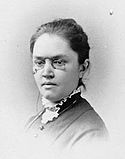Katharine Lee Bates Quote
Related Quotes
Empowered Women 101: The moment you ignore bad behavior, in order to win a person's affection you have not won anything, but a person that has behavioral problems. If you couldn't fix their behavior b...
Shannon L. Alder
Tags:
bad behavior, behavior problems, blinded, history, ignore, issues, men, overlook, stayingpositiveu com
Attempts to locate oneself within history are as natural, and as absurd, as attempts to locate oneself within astronomy. On the day that I was born, 13 April 1949, nineteen senior Nazi officials were...
Christopher Hitchens
Tags:
alcohol, alcoholism, andrei gromyko, antisemitism, astrology, astronomy, beijing, birth, birthdays, breastfeeding
About Katharine Lee Bates
Katharine Lee Bates (August 12, 1859 – March 28, 1929) was an American author and poet, chiefly remembered for her anthem "America the Beautiful", but also for her many books and articles on social reform, on which she was a noted speaker.
Bates enjoyed close links with Wellesley College, Massachusetts, where she had graduated with a B.A., and later became a professor of English literature, helping to launch American literature as an academic speciality, and writing one of the first-ever college textbooks on it. She never married, possibly because she would have lost tenure if she had. Throughout her long career at Wellesley, she shared a house with her close friend and companion Katharine Coman. Some scholars have assumed that this was a lesbian relationship, considering some exchanges of letters sufficient proof, others believe their relationship may have been a platonic "Boston marriage" in the contemporary phrase.
Bates enjoyed close links with Wellesley College, Massachusetts, where she had graduated with a B.A., and later became a professor of English literature, helping to launch American literature as an academic speciality, and writing one of the first-ever college textbooks on it. She never married, possibly because she would have lost tenure if she had. Throughout her long career at Wellesley, she shared a house with her close friend and companion Katharine Coman. Some scholars have assumed that this was a lesbian relationship, considering some exchanges of letters sufficient proof, others believe their relationship may have been a platonic "Boston marriage" in the contemporary phrase.
